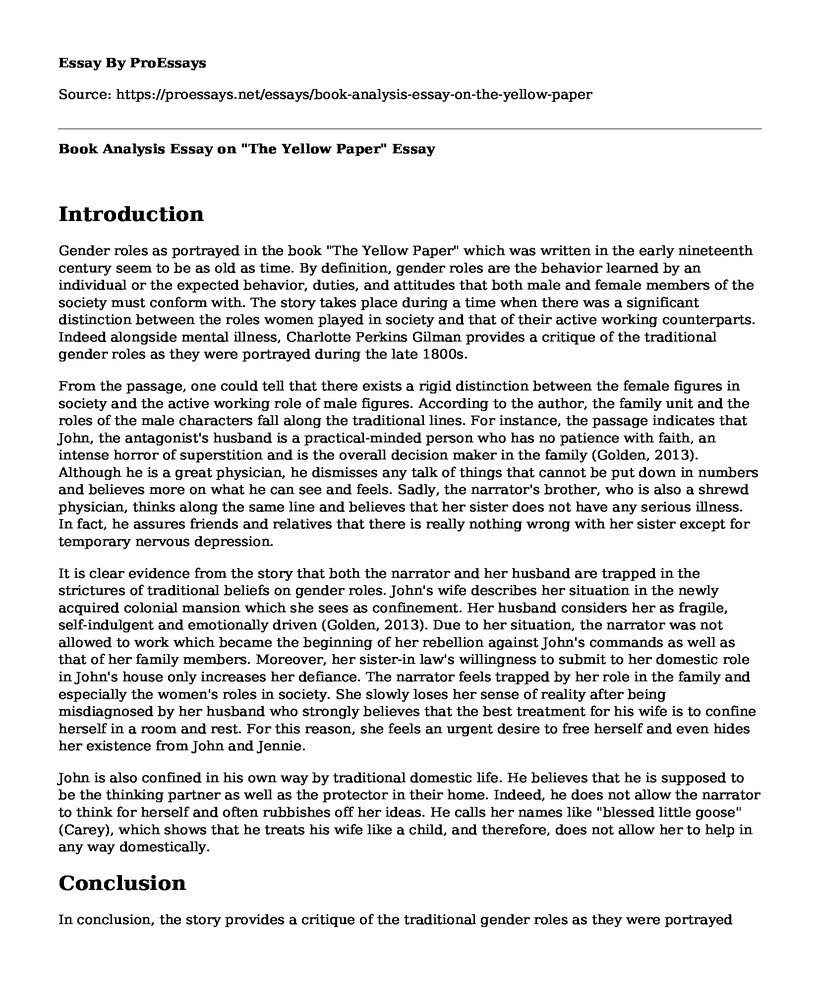Introduction
Gender roles as portrayed in the book "The Yellow Paper" which was written in the early nineteenth century seem to be as old as time. By definition, gender roles are the behavior learned by an individual or the expected behavior, duties, and attitudes that both male and female members of the society must conform with. The story takes place during a time when there was a significant distinction between the roles women played in society and that of their active working counterparts. Indeed alongside mental illness, Charlotte Perkins Gilman provides a critique of the traditional gender roles as they were portrayed during the late 1800s.
From the passage, one could tell that there exists a rigid distinction between the female figures in society and the active working role of male figures. According to the author, the family unit and the roles of the male characters fall along the traditional lines. For instance, the passage indicates that John, the antagonist's husband is a practical-minded person who has no patience with faith, an intense horror of superstition and is the overall decision maker in the family (Golden, 2013). Although he is a great physician, he dismisses any talk of things that cannot be put down in numbers and believes more on what he can see and feels. Sadly, the narrator's brother, who is also a shrewd physician, thinks along the same line and believes that her sister does not have any serious illness. In fact, he assures friends and relatives that there is really nothing wrong with her sister except for temporary nervous depression.
It is clear evidence from the story that both the narrator and her husband are trapped in the strictures of traditional beliefs on gender roles. John's wife describes her situation in the newly acquired colonial mansion which she sees as confinement. Her husband considers her as fragile, self-indulgent and emotionally driven (Golden, 2013). Due to her situation, the narrator was not allowed to work which became the beginning of her rebellion against John's commands as well as that of her family members. Moreover, her sister-in law's willingness to submit to her domestic role in John's house only increases her defiance. The narrator feels trapped by her role in the family and especially the women's roles in society. She slowly loses her sense of reality after being misdiagnosed by her husband who strongly believes that the best treatment for his wife is to confine herself in a room and rest. For this reason, she feels an urgent desire to free herself and even hides her existence from John and Jennie.
John is also confined in his own way by traditional domestic life. He believes that he is supposed to be the thinking partner as well as the protector in their home. Indeed, he does not allow the narrator to think for herself and often rubbishes off her ideas. He calls her names like "blessed little goose" (Carey), which shows that he treats his wife like a child, and therefore, does not allow her to help in any way domestically.
Conclusion
In conclusion, the story provides a critique of the traditional gender roles as they were portrayed during the late 19th century. The book indicates that everyone is doomed in a patriarchal society and no one can successfully escape from the rigid gender expectations placed upon them.
References
Carey, E. Controlling the Female Psyche: Assigned Gender Roles in "The Yellow Wallpaper". Retrieved from https://commons.marymount.edu/magnificat/controlling-the-female-psyche-assigned-gender-roles-in-the-yellow-wallpaper/
Golden, C. J. (2013). Charlotte Perkins Gilman's The yellow wall-paper: a sourcebook and critical edition. Routledge.
Cite this page
Book Analysis Essay on "The Yellow Paper" . (2022, Dec 20). Retrieved from https://proessays.net/essays/book-analysis-essay-on-the-yellow-paper
If you are the original author of this essay and no longer wish to have it published on the ProEssays website, please click below to request its removal:
- Bone of Contention on Gay Parenting Essay Example
- King Lear Essay Example
- Essay Sample on Community Practice Definition and Brief History
- Essay on Assisted Reproduction: Surrogacy, IVF and Designer Babies
- Essay on Vietnam Veterans Memorial Hall: Honoring Sacrifices of U.S. Service Members
- Essay Example on Trees Talking: Unravelling the Symbiotic Networks of Nature with Suzanne Simard
- Victim Services and Courts - Essay Sample







